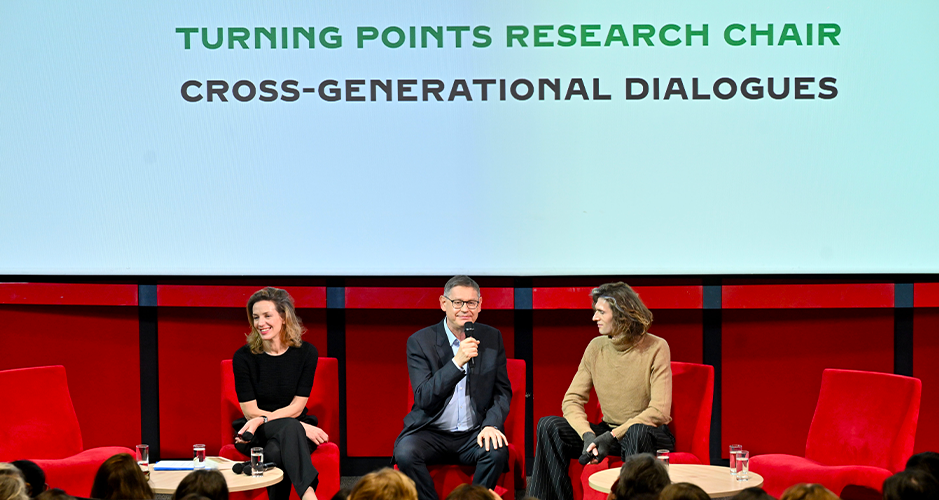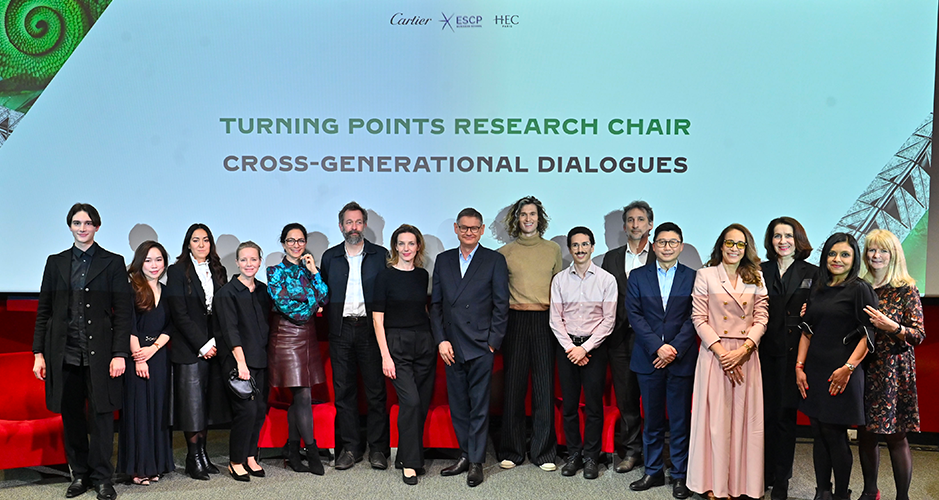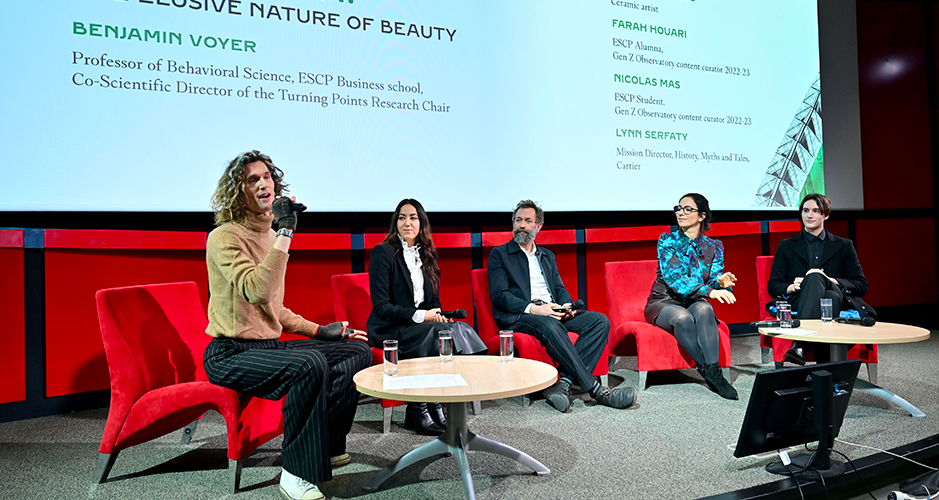Cyrille Vigneron (ESCP 82) brought ESCP and HEC Paris students in the same room for cross-generational dialogues
Cyrille Vigneron (ESCP 82) brought ESCP and HEC Paris students in the same room for cross-generational dialogues
A groundbreaking joint research Chair between HEC Paris-ESCP business school and Maison Cartier, launched in January 2021, has just renewed for a further 3 years, a mark of recognition of its excellence. This is a great example showing two business schools cooperating to unlock value as Cyrille Vigneron mentioned: “During the past 3 years, the GenZ observatory of the Turning Points Chair has produced great insights on what GenZ thinks of important societal topics. As these topics are universal, it is now important to open up the conversation to other generations, to better understand other’s point of views or just realise that some apparently new questions are not as new as they seem.”
On March 20, ESCP Business School opened its door at the Champerret campus to welcome voices of the corporate world, science, academia, and the arts in a joint dialogue dedicated to exploring the elusive nature of beauty and how to transcend generational barriers. Offering the amazing opportunity to gather in a same room +200 HEC Paris and ESCP students to get inspirations from the conversations, these panels were introduced by Cyrille Vigneron (ESCP Alumnus and CEO, Cartier), and moderated by the two co-scientific Directors of the Chair Prof. Anne-Laure Sellier (HEC Paris) and Prof. Benjamin Voyer (ESCP).

These cross-generational dialogues convened a select group of panellists with a shared conviction to cultivate a stage for contemporary debate and philosophical reflection, exploring its implications across layers of society. These dialogues gathered both former and current content curators from the GenZ Observatory, an initiative spearheaded by Prof. Ben Voyer since 2021.
Prof. Anne Laure Sellier moderated a roundtable discussion to discuss how to transcend generational barriers, inviting on stage Veronica Prat Van Thiel, International High Jewellery Director, Cartier; Tiffany Lam, HEC Paris student, Gen Z Observatory content curator 2023-24 ; Sinan Bursa, Data Manager, Cartier; Gen Z Observatory content curator 2021-22 and Ginevra Capece Galeota, Director, Global Creative Lead and Strategist, Meta
Tiffany Lam, HEC Paris student, Gen Z Observatory content curator (2023-24) ; Alma Ullen, ESCP Alumni, Gen Z Observatory content curator (2021-22) ; and Sayoko Magron, ESCP Student and Gen Z Observatory content curator (2023-24), attended and shared with us their takeaways. “Many Gen Z grapple with uncertainty about the future. In these moments, conversations with older generations provide reassurance and perspective. Hearing their stories of overcoming challenges reminds us that adversity is a universal human experience, bringing us greater resilience and optimism. At the same time, it is important to show appreciation and be inviting if we wish to engage other generations in meaningful dialogues.” said Tiffany.

“The imperative for dialogue across generations was explored in the second panel. How should we approach age as a diversifying factor in contemporary society? Raised in a far more international context than preceding generations, younger individuals have become increasingly globally fluent from an early age. The discussion thus delved into the evolving nature of diversity in today's society and highlighted the risks posed by silos between age groups, which may hinder the sharing of valuable knowledge from both sides. From reflections on how we relate to the notion of age and belonging in Ancient Greece, to the contextualisation of the technological era, it became evident that the enduring human capacities for empathy and mutual concern remain profoundly relevant. While generational narratives often emphasise differences between younger and older generations, the panel underscored the universality of certain experiences and the importance of empathy in comprehending the sense of isolation within today's changing landscape, regardless of age.” said Alma.
“I feel like the danger of multi-generational dialogue would be to exchange each point of view by attributing viewpoints solely based on age. That can lead to deterministic discussions that fails to capture the complexity and diversity of perspectives within each generation. The cross-generational dialogue event managed to overcome this challenge, to create a discussion that transcended generational boundaries, to create the richest, most diverse and most fruitful dialogue.Panelists of the second roundtable for example were not introduced by age or generation, but by their relationship to technology. Indeed, technology is often approached as a factor of division among generations, "pre-tech" and "post-tech". It was therefore a very refreshing and exciting way to address this divide from a new perspective that crosses generations. ” explained Sayoko.
Before this 40-min fascinating debate about cross generational dialogues, Prof. Prof. Ben Voyer invited Lynn Serfaty, Mission Director, History, Myths and Tales, Cartier ; Nicolas Mas, ESCP student, Gen Z Observatory content curator 2022-23 ; Farah Houari, ESCP alumni, Gen Z Observatory content curator 2022-23 ; Emmanuel Boos, Ceramic artist to take part into the second panel to discuss about the elusive nature of beauty.
Beauty emerged as a paradoxical force in the opening panel, challenging conventional definitions. It encompasses contradictory dimensions, from perfected harmony to chance and accidents. Audience questions about the toxicity of beauty and a post-beauty world prompted a redefinition across generations. Two types of beauty emerged: one idealized in the arts and poetry, the other prosaic and sensitive, often tied to appearance as social status. The conversation concluded that beauty may be found in imperfection, transcending generations.